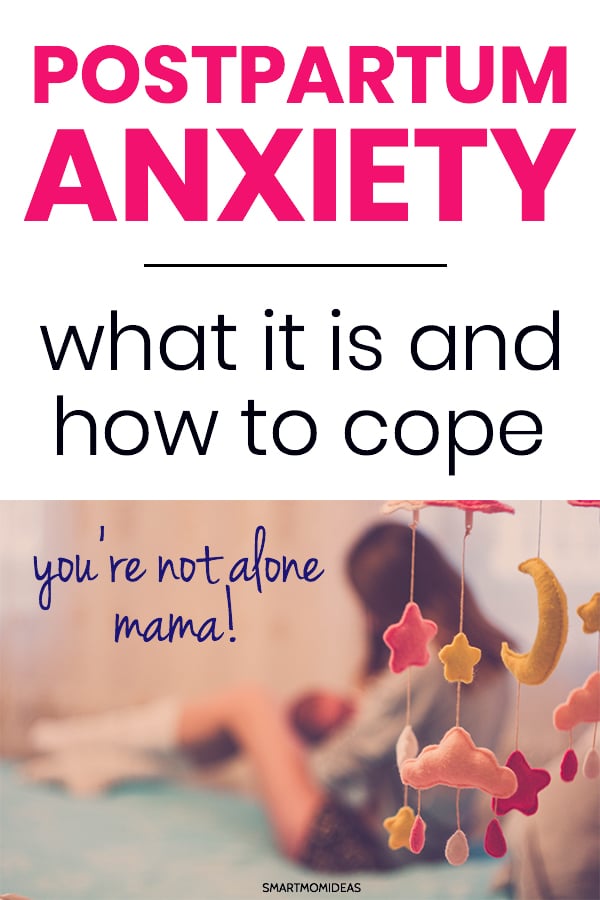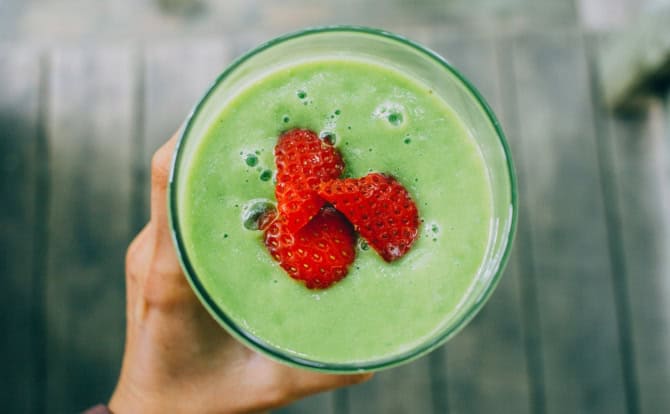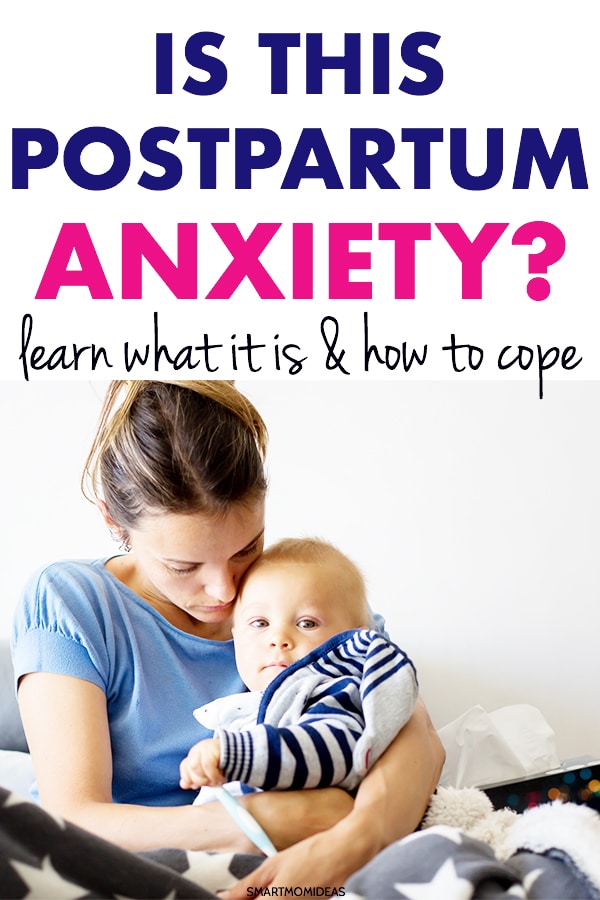Learn what postpartum anxiety is and how you can cope with it effectively.

Motherhood has many beautiful joys. But they can be clouded out with constant worries and anxiety that takes on a life of its own!
Been there, mama?
Learn how to cope with your postpartum anxiety and be on your way to a healthy recovery!
You don’t have to keep suffering and accepting it as a part of your life.
There is hope!
I want to share what postpartum anxiety is and what you can do to cope and recover (yes, recovery is very possible!).
Postpartum Depression

First, let’s briefly look at the cousin of postpartum anxiety.
Postpartum depression (PPD) is depression that a mother experiences after her child is born. It’s often due to the hormone changes in her body, sleep deprivation, and the major adjustments to motherhood as a whole.
Unlike the baby blues, it doesn’t go away on its own, and it lasts more than 2 weeks.
Symptoms include:
- Anger
- Guilt, withdrawal
- Overwhelm
- Crying
- Hopelessness
- Lack of emotion
- Changes in appetite
- Low self-esteem
- Resentment
Postpartum Anxiety
Postpartum anxiety (PPA) can be summed up as anxiety mothers face that have to do with fear and worry concerning the health and well being of their baby. It’s also fear and worry about the their future that torments them and hinders their ability to function.
These feelings can begin anytime between baby’s birth and first year of life.
Here are a few common symptoms:
- Dizziness
- Sleepiness
- Fear your baby will get sick or die
- Hot flashes
- Rapid heart beat
- Nausea
- Inability to sit still or focus
Just as we can’t fit motherhood into a box, PPA is the same way. There are many causes and triggers that vary with each mother who experiences it.
One mother may be worried and anxious about when she’ll ever have the chance to get enough sleep to stay alive. While yet another mother may be overwhelmed by anxious thoughts that her baby may die of SIDS (sudden infant death syndrome).
A postpartum mom who has multiple children might suffer from PPA which stems from her worry about her ability to care properly for her other children. Especially if she has little to no help.
It can become so hard that she starts dreading and worrying about how she’ll get through the next day.
Here are other factors that can cause a mother to experience PPA:
- Baby is not eating well or gaining weight
- Keeping baby safe and providing for baby
- Being able to work to support your family as a single mother with a newborn
- Poor partner support
- Isolation
- Weaning baby from the breast or from sleeping in your bed
- Maintaining regular activities and adjusting to new life changes
- Sleep deprivation
- Lack of nutrition
So what’s the difference between PPD and PPA?
While many symptoms overlap, here’s how you can tell the difference. The symptoms and feelings relating to postpartum depression are primarily rooted in feelings of concern, loss, and hopelessness about the past.
For example, “Now that I’m a mother, I’ll never get to experience my dream of traveling the world,” or grieving as your friends don’t understand the challenges you face as a mother.
They get to continue their lives as normal, but your life has changed so much.
You may even begin to feel as though you’re losing them because they don’t understand motherhood.
Those thoughts in themselves are not uncommon. But they can become so intense that they can lead you into a deep depression about what could have been, but is not now.
With postpartum anxiety, the anxiety and worry is more about the future than the past.
“How am I going to maintain caring for myself and my child? I haven’t slept well in days,” or, “ What if I’m not able to keep producing enough breast milk for my baby? I don’t want my baby to starve or have to drink formula.”
Postpartum depression and postpartum anxiety are closely related. A lot of mothers who suffer from PPD also suffer from PPA.
This is why it’s so important to seek help to prevent it from getting worse.
Let’s Uncover the Lies About Motherhood
It’s amazing how us mothers face so many of the same challenges, yet it’s not talked about frequently enough! It’s almost like we have to hide in shame as if we’ve done something wrong.
Before we start looking at some of the things you can do to recover from postpartum anxiety, let’s be bold for a moment. Let’s reveal some of the lies most of us have believed about motherhood. You may find that your anxiety is rooted in some of these beliefs.
As you read through this list, take a moment to process what you believe about each statement.
- “I’m a bad mother because I’m feeling this way”
- “Good mothers don’t struggle and they certainly don’t get depressed.”
- “I’m a new mom, this is supposed to be the happiest time in my life”
- “I should be able to do it all without help (or little help)”
- “If I ask for help, it means I’m just being lazy”
- “I will never live a fulfilling life because being a mother is just too hard and demanding”
- “I’m a mother now. I come last, and I’m a horrible mother for wanting to take care of myself before my child”
These are all lies, mama! You must recognize the lies and replace them with truth!
Talk to Your Healthcare Provider
It can be a good idea to discuss how you’re feeling with a trusted healthcare provider.
A lot of mothers decide not to mention it because they either fear that their children will be taken away or they don’t want to be pressured into taking medications without the freedom to explore other, more natural cures.
These are valid concerns!
My suggestion is to search a holistic or naturopathic healthcare provider that you believe has your best interest as heart. These types of healthcare providers practice medicine in a way that considers all of the different ways your body works together in relation to your overall health.
They will also be more likely to respect your beliefs and views on pharmaceutical medicines and not pressure you in that direction.
Speak to a Therapist
Speaking with a therapist can be a relief and an effective way to work through your anxiety. Again, please don’t buy into the lie that you’re not a great mom because you’re seeing a therapist.
You may find healing through the reality that there really is no perfect parent out there, mama.
Working with a therapist can help you in a few different ways:
- You’ll have an unbiased, non-judgemental person to share your thoughts and concerns with.
- They will help you identify and dissect problems you’re facing while proactively helping you to find solutions.
- They can help you create reasonable goals (large and itty bitty) that are personal to your well being. They will also hold you accountable and encourage you to achieve those goals.
When looking for a therapist, it’s best to seek out specialized help. That means finding a therapist that is professional and has a track record of helping mothers that suffer specifically from PPA.
You may not get the help you need by settling for someone who is inexperienced and more of a general therapist.
If your insurance doesn’t cover a specialized therapist, it’s still best to explore your options outside of what your insurance will cover to ensure you get the best care possible. Ask around to find a price range that’s affordable for you.
Share How You’re Feeling With Loved Ones
Sharing how you feel can be embarrassing and uncomfortable, but it’s important to do so. At least with your close friends and family.
Everyone might not understand. Even other moms may not understand the extent of your sufferings. But I still encourage you to do so, mama.
When we keep these feelings to ourselves it can feel like we’re dying inside. We can actually create even more anxiety for ourselves by trying to keep acting like everything is fine.
Your loved ones may not know what to say or how to help at first, but don’t be discouraged!
If you need help explaining postpartum anxiety to your partner, Breaking Mum and Dad: The Insider’s Guide to Parenting Anxiety is a great place to start. Share it with them!
It’s written for moms and dads to understand what postpartum depression is as well as practical ways to cope. It also shares stories to uplift and inspire you and your partner to press through those tough days together with hope and a smile!
Join Motherhood Support Groups
Motherhood is one of the toughest responsibilities you’ll ever face in your life. Making the transition can feel unbearable!
Connecting with other moms through a mommy support group can be a breath of fresh air. You’ll have someone to bounce ideas off of, encourage you, and just to talk to.
Since leaving the house is hard enough, you’ll be glad to know there are quite a few groups that meet online (they’ll vary depending on your location).
Exercise
Exercising has many benefits, mama! But let me just name two! Mood and sleep improvement! Since sleep deprivation has a direct connection with postpartum anxiety, exercise should be a priority for you.
Don’t adopt the “Go big or go home” mentality, because that’s probably going to just take your anxiety to the next level.
Just start by taking a short 15 or 20 minute walk outside everyday 3 times a week.
Rigorous exercise is not the goal, consistency is. Try not to strain your body. Just stick to something light to begin with (like walking).
Depending on your anxiety level, it may be hard for you to bring your baby with you. If so, ask someone you trust (like your partner or parent) to care for your child while you take a walk.
It usually isn’t until we get out of the home, smell the fresh air, and breathe deeply that we start to feel more relieved. Your thoughts can turn from worry to peace and from fear to calm.
Play your favorite music as you walk or enjoy the birds singing as you walk in quiet.
Improve Your Nutrition

Are the demands of motherhood so intense that you actually forget to eat, mama?
When you don’t make eating healthy (or frequently enough) a high priority, your mental health is at risk.
Your body has gone through so many changes up until this point and you need to continue to care for yourself.
The first week of your baby’s life is particularly challenging.
If you’re looking for ways to eat more, but you can’t seem to find the time to prep, cook, or serve meals, here are some things you can try:
- Ask friends or family to help you cook and serve meals (even just once a week). If you can get 7 people to cook and serve you dinner, that’s a huge help!). Maybe your husband can make dinner 3 times per week. Maybe your sister can make you breakfast, lunch, and dinner for one whole week. Maybe your aunt can come every night for 3 or 4 hours to make dinner for your entire family, tend to your needs, and help get your older children ready for bed. You never know! If you don’t ask for the help you need, no one may ever know.
- Find a paid home care provider to assist you in making meals. This person would come to cook meals in your home.
- Use a personal chef. Although this option is not entirely cheap, it’s still a great investment into your mental and physical health. It’s similar to the paid home care provider and can actually be a great option during the first 6 weeks of your postpartum recovery. Especially if you don’t have a good family, friends, and or/partner support system. A personal chef will typically do your grocery shopping, cook the meals in your home, serve, and clean up for you as well. He or she can also label the meals and help you store them in the freezer to eat at a later time throughout the week.
Communicate Clearly
How many times have you been frustrated from unmet expectations you set (in your head) towards those around you.
If you’re human, you’ve done this at least once.
The truth is, no matter how uncomfortable it makes you, you have to speak up and ask for what you want from those around you.
If you don’t ask, how will anyone know or have the chance to help you? You also need to be clear and don’t assume anything. You may not be getting the help you need because you’ve not expressed your desires to others.
Learn About Postpartum Anxiety
Remember mama that you’re not alone.
Reading books and articles, as well as watching documentaries will help you see how widespread PPA is among mothers and how you can cope.
Some of these books shed some light on the topic of PPA:
- The Fourth Trimester: A Postpartum Guide to Healing Your Body, Balancing Your Emotions, and Restoring Your Vitality
- The Pregnancy and Postpartum Anxiety Workbook: Practical Skills to Help You Overcome Anxiety, Worry, Panic Attacks, Obsessions, and Compulsions
- The Battle: A Mother’s Guide to Conquer Depression, Anxiety, and Self Doubt
There’s not one definite solution for recovery because every mother is different. But it sure helps to know you’re not alone.
As a society, we tend not to want to talk about mental health issues because those who suffer are often stereotyped and labeled as crazy or paranoid.
It’s simply not true! It takes incredible courage to speak up for the safety and well being or both you and your baby. Suffering in silence is often more detrimental than seeking help, mama.
Your On Your Way!
There’s hope for a complete recovery! Please don’t embrace the thoughts (lies!) that tell you you’re not a great mother. You are!
This mother was able to cope with postpartum anxiety by using minimalism and this can help you too!
Postpartum anxiety is extremely common and there are definitely ways to improve your mental health. Try the tips I’ve listed above and don’t give up.
It’s okay to take care of yourself and ask for the help you need. It may be hard to believe right now, but your life is going to get brighter and you won’t always feel this way.
I hope you’ll experience relief and a speedy recovery!
What tips can you share with the rest of us on this important topic? What have you found that has eased your anxiety? Help other mothers by sharing your tips, story, or encouragement in the comments below.
Don’t forget to pin!





Leave a Reply